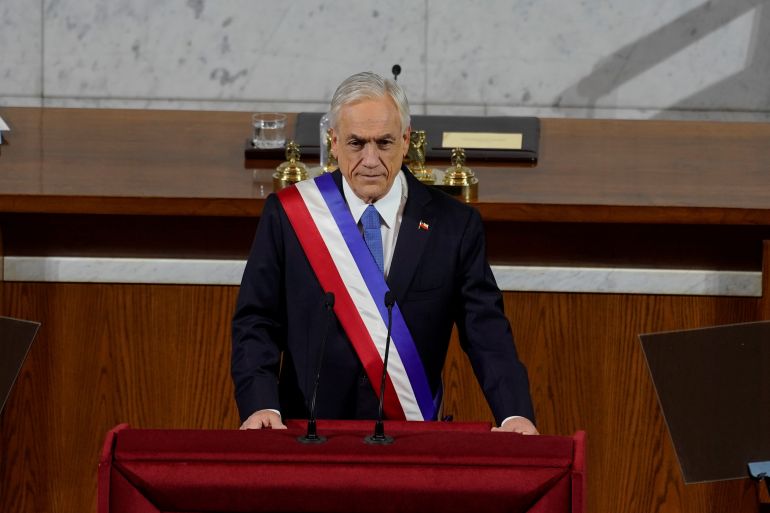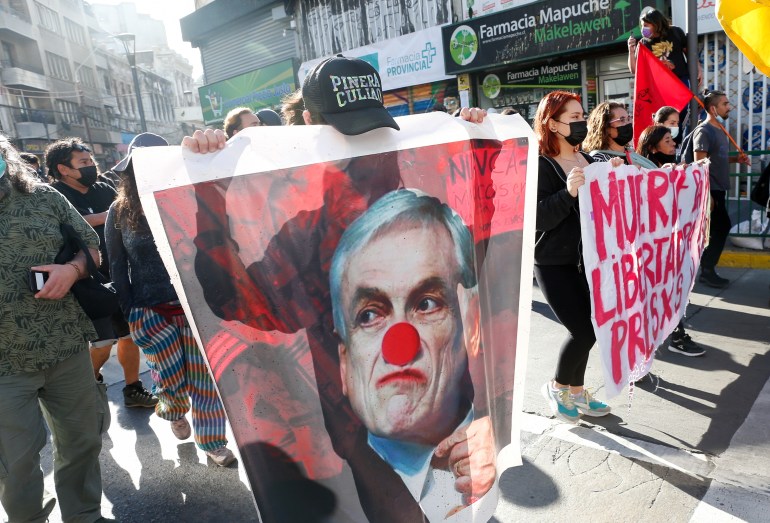Chile’s unpopular president delivers solitary farewell
Facing widespread criticism, Sebastian Pinera’s low popularity could affect upcoming presidential vote, analysts say.

Santiago, Chile – Chilean President Sebastian Pinera began his last address to the nation this week by apologising to families hit by an economic crisis caused by the coronavirus pandemic.
“Many people feel anger and frustration because they did not always receive the help they needed at the right time,” he told lawmakers on Tuesday evening, surrounded by the imposing walls of the Senate Assembly Hall at the Congress building in Valparaiso.
Keep reading
list of 4 itemsChile’s assets dive as government suffers electoral defeat
Chile chooses independents to draft new constitution
‘Historic’: Chile votes for who will draft new constitution
Due to the pandemic, only a small audience – all of his cabinet members and some leaders of political parties – were present for his two-hour farewell speech, delivered less than six months before elections will usher in a new president.
Right-wing newspaper La Tercera welcomed Pinera’s conciliatory message, as he underscored the importance of dialogue and reaching consensus on several key issues in Chile.
Despite that, the president will be leaving office widely unpopular, with his once strong base of support now collapsed and his right-wing coalition still reeling from a shock defeat in last month’s elections – and that could have an effect on the upcoming presidential polls, analysts say.
“Pinera has been abandoned by the people who voted for him and what is worse, by the right-wing supporters and Congress members,” Fernando Ayala, a former diplomat, told Al Jazeera. “The overwhelming majority of Chileans reject the way he has faced the social, economic and health crisis.”
Status quo fatigue
Pinera, who was elected for a second term in December 2017 with 54.5 percent of the vote, has been criticised for taking too long to deliver economic assistance that he promised to Chilean families. Chileans have also said the aid is insufficient to meet their needs amid an economic downturn.
His government has been under constant scrutiny for its handling of the pandemic, as well. The Medical Association of Chile has repeatedly accused health authorities of not being transparent in the delivery of coronavirus-related information and explaining how decisions are adopted.
Meanwhile, many of Pinera’s supporters privately hold him responsible for his right-wing coalition’s disastrous results in last month’s “mega-elections”, in which Chileans voted for 155 representatives who will draft the new constitution.
It was the worst defeat for the country’s right-wing in decades, political analysts have said.
Robert Funk, an academic at the Institute of Public Affairs of the University of Chile, said the outcome showed that “Chileans are suspicious of traditional politicians, tired of the existing political parties, and eager for new faces”.
“So, Pinera aside, this mood is affecting all parties and candidates,” Funk told Al Jazeera.

Surprise pledge
In that context, Chileans held no high expectations for Pinera’s speech on Tuesday evening. His supporters had previously said they would be satisfied if the president talked a bit about reviving the economy and mentioned a few public security issues.
But that changed when Pinera announced that his administration would fast-track a law legalising same-sex marriage. “The time for same-sex marriage has arrived,” he said in his speech.
“I believe we must take an in-depth look at the value of freedom, including the freedom to love and form a family with a loved one.”
Such a move has been long expected, as the initiative was promoted by former President Michelle Bachelet more than 10 years ago, and it was applauded by most Chileans – with the exception of Pinera’s conservative right-wing coalition.
The bombshell announcement deepened fissures in the government and took many by surprise, including Pinera’s cabinet members, as same-sex marriage was never on the public agenda or in the government programme.
Pinera’s ‘legacy’
Still, Pinera has fiercely defended his leadership and what he has called his political “legacy”.
There is no doubt that the president’s greatest success in his second term in office has been the government’s handling of the COVID-19 vaccination programme. Pinera and his team were quick to obtain access to vaccines at a time when many other countries hesitated.
According to Our World in Data, which tracks coronavirus-related figures, Chile in March became the country with the highest vaccination rate against COVID-19 in the world, with an average of 1.08 jabs delivered a day per 100 people.
But this has done little to bolster Pinera’s popularity; he currently has a nine percent of approval rating, and political analysts say that could affect the results of the presidential elections in November.
Ayala, the former diplomat, said while opposition forces remain divided, “right-wing candidates are trying to distance themselves from Pinera and hope to re-enchant their potential voters” ahead of the vote on November 21.
‘Electoral defeat’
Nevertheless, the president appears to be leaving office still insisting that his administration did great things for Chile.
“His speech seems to reveal a parallel reality, with lots of names of programmes but few advances – and this is what the general population perceives,” Heraldo Munoz, a former presidential candidate and president of the Party for Democracy (Partido por la Democracia), a staunch Pinera critic, told journalists on Tuesday afternoon.
Political analysts also have pointed out Pinera could have led the process of writing a new constitution to replace the Augusto Pinochet dictatorship-era document that has been in place for decades. But the right-wing’s implosion at the polls made that impossible.
“The paradox is that this is a president who came to power with the idea of undertaking a second transition and spearheading a new phase of development,” political scientist Mireya Davila told Al Jazeera.
“Instead, he ended up burying the Pinochet constitution and facing an electoral defeat for his political sector not seen since 1990.”